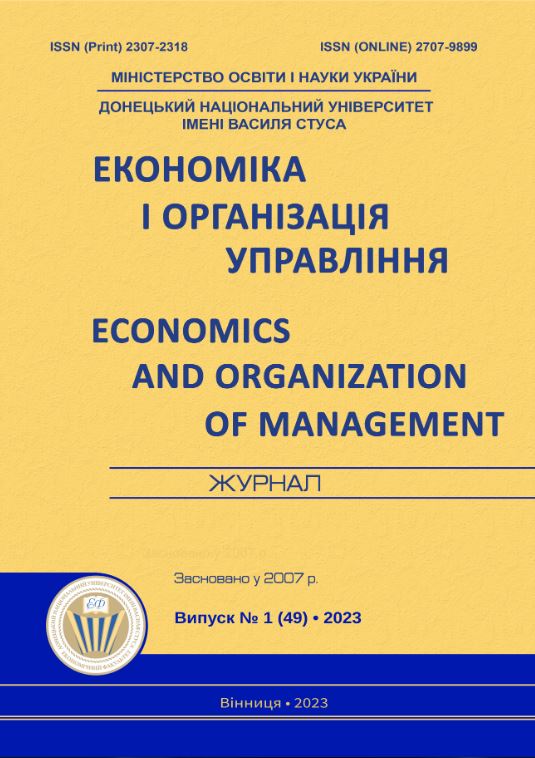Research of managing intellectual potential of enterprises in the post-war conditions
DOI:
https://doi.org/10.31558/2307-2318.2023.1.6Keywords:
behavioral models; labor market; conceptual positions; methodology; human models; economic behavior; paradigm. intellectual potential; management of intellectual potential; post-war period; components of intellectual capital; SWOT analysis; scenarios for the generation of intellectual potential; competitiveness of the enterpriseAbstract
The article research of managing intellectual potential of enterprises in the post-war conditions. Scientific approaches to determining the features of intellectual potential management are summarized. It was established that the intellectual potential as a component of the company’s activity acquired a significant role in the period of post-industrial development of society - with the advent of digital technologies, significant automation of production and scientific and technical progress. The components of intellectual capital are singled out (professional, scientific, technical and creative knowledge of employees; previous experience of the enterprise; intellectual property; organizational and management structure; innovations and new technologies; information networks). A SWOT analysis of intellectual potential management in post-war conditions was carried out. Scenarios for the generation of intellectual potential (positive and negative) are proposed. It is concluded that the situation of the Ukrainian economy in the context of the future post-war reconstruction is unique for the development of intellectual potential management algorithms, in particular, it is suggested to emphasize the motivation of employees to generate ideas and increase the level of creativity.
References
Ostrovska H. (2018) Management by intellectual potential of enterprise. Galician economic journal (Tern.), vol. 55, no 2, pp. 88-97. Retrieved from https://galicianvisnyk.tntu.edu.ua/pdf/55/264.pdf.
Shkoda T., Tepliuk M., Sahaidak M. (2020). Intellectual potential management in forming strategic partnership of science-business-education. Baltic Journal of Economic Studies, 6(5), 221-232. Retrieved from http://www.baltijapublishing.lv/index.php/issue/article/view/946/1000.
Huang W. (2018). Human Resource Risk Identification and Prevention. Control and Systems Engineering, 1 (1), 16-21. Retrieved from https://www.researchgate.net/publication/325728047_Human_Resource_Risk_Identification_and_Prevention.
Nosova T. (2014) The economic essence of the category of «intellectual potential». Mechanism of Economic Regulation, 2, 159–166. Retrieved from https://mer.fem.sumdu.edu.ua/content/acticles/issue_21/TANYA_I_NOSOVAThe_Economic_Essence_of_the_Category_of_Intellectual_Potential_.pdf.
Dyba L.M. (2011) The essence of the concepts of intellectual potential and intellectual capital as economic categories. Economic Bulletin, 17/1, 124-129.
Moiseienko I.P. (2007) Problems of structural analysis of intellectual potential of enterprises. Current Problems of Economics, 10, 165-170.
Pererva P., Marchuk L. (2018). Intellectual potential as an economic category. Bulletin of the National Technical University «Kharkiv Polytechnic Institute» (economic sciences), 15 (1291), 53-63. Retrieved from http://repository.kpi.kharkov.ua/handle/KhPI-Press/36345.
Kimbrough R. L., Componation P. J. (2009). The relationship between organizational culture and enterprise risk management. Engineering Management Journal, 21(2), 18–26. Retrieved from https://doi.org/10.1080/10429247.2009.11431803.
Acharyya M., Mutenga S. (2013). The benefits of implementing enterprise risk management: Evidence from the non-life insurance industry. Enterprise Risk Management, 6 (1), 22–24.
Bertinetti G. S., Cavezzali E., Gardenal G. (2013). The effect of the enterprise risk management implementation on the firm value of European companies. Working Paper (10). Department of Management, Universita Ca’Foscari Venezia.
Sekaran U., Bougie R. (2016). Research methods for business: A skill building approach. John Wiley & Sons.

